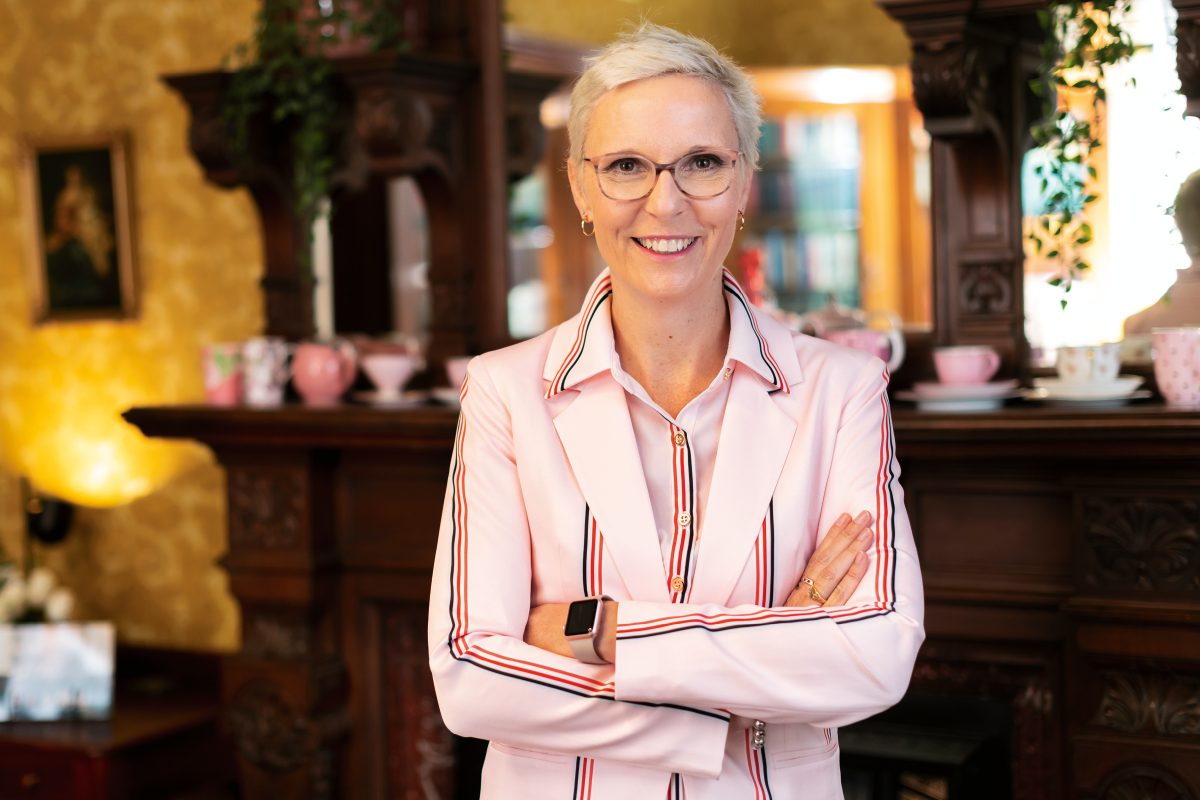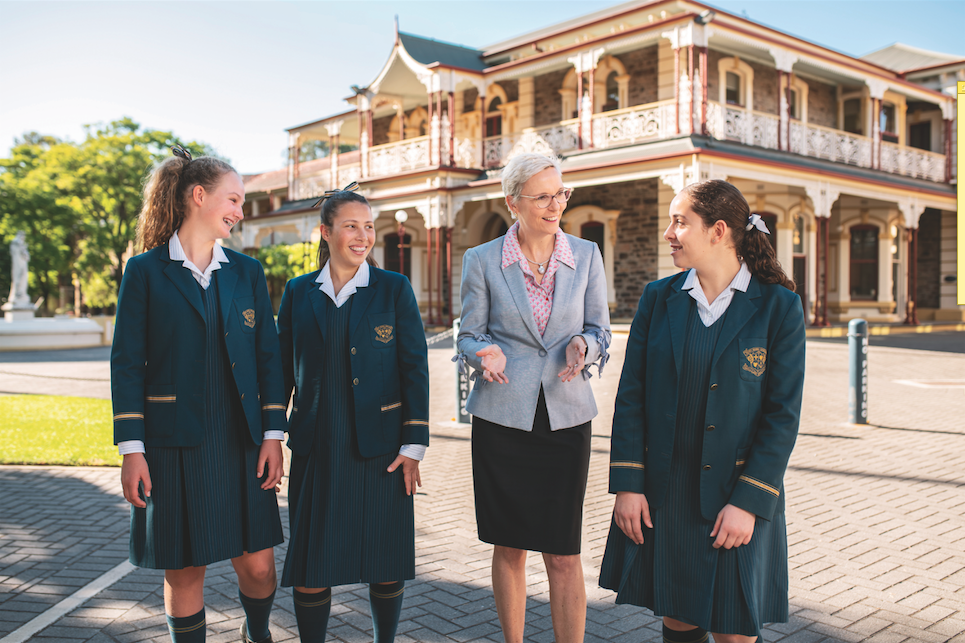On paper, Nicole Archard looks like the perfect choice to lead an illustrious all-girls school like Loreto College Marryatville. Aside from the requisite Diploma of Education with a Bachelor of Arts majoring in english literature and ancient history, she holds a master’s in children’s literature and creative writing, educational leadership and theological studies. She also holds a PhD.

And given her research for the latter focused on women, leadership and girls’ education, it’s little surprise she was a shoo-in for the gig. Academic credentials aside, Nicole also loves her job.
“There can be no greater honour than educating girls,” she smiles. “I’ve always believed education can change people’s lives, as it has my own. And I believe passionately in the capacity of girls and women. So what I love most about my role at Loreto is helping girls to become women of influence and change.”
Top marks
When Nicole first joined the college in June 2016, enrolments were in serious decline. In the years since her tenure, however, they have soared. In addition, Loreto has been awarded gold in the 2019 Innovative Schools awards and, more recently, won trophies for excellence in the 2021 Australian Education Awards for Best Student Wellbeing Program and Department Head of the Year.
The latter two prizes acknowledge Nicole’s significant role in developing the school’s proprietary Social, Emotional and Academic Development (SEAD) program. “SEAD acknowledges the developmental stages of young women in order to provide a holistic approach to the growth of knowledge and skills required for life success,” she explains.
What I love most about my role at Loreto is helping girls to become women of influence and change.
“We’ve seen how it actively nurtures a positive self-concept and sense of selfefficacy, undefined by gender stereotypes – and that’s vital for ensuring girls and women achieve positive life outcomes, both in school and afterwards.”
A high-tech high school
The other initiatives spearheaded by Nicole are technological. Loreto now has its own data analytics program that aggregates and analyses test scores and other statistics in real time. “Loreto’s Learning Analytics program has become a powerful tool for informing and improving our pedagogical practice,” Nicole confirms.
“Teachers can immediately identify which students need support or enrichment in an area. Likewise, students can review their assessment results to set goals and strategies for improvement. It’s empowering everyone to take responsibility for their own learning.” The embrace of new technology extends to the curriculum, with Loreto taking the more traditional STEM subjects to the next level.
“We’re implementing the likes of robotics, app development, biochemistry, artificial intelligence and environmental science,” she says proudly. “Next year, we’re adding extended reality to our Year 9’s already successful Futures Project. It will encompass augmented, mixed and virtual realities, and builds upon our specially designed course that focuses on research, design thinking, entrepreneurialism, innovation and social justice.”

Making her beloved school more environmentally sustainable is another major goal, with the installation of solar panels already reducing Loreto’s total power consumption by one-third. However, that’s only the beginning, Nicole says.
“By next year, we’ll have planted 200 trees on school grounds. In two years, we will be a 100 per cent plastic-free campus, while our paper wastage will be reduced by half. By 2025, 60 per cent of our energy needs will be produced onsite. And by 2030, we’ll be net zero in carbon emissions.”
Perfectly composed
When asked if she is as ‘stern’ as many school principals often appear to be, Nicole laughs and offers up an anecdote by way of answer. “Another principal I once worked for often used the phrase, ‘Come as you are, and you’ll be treated with love,’” she shares.
“Education is a complex industry, where students, staff and parents all have their own stories and needs. “So, for me, keeping this saying in mind ensures that equity, tolerance, acceptance and kindness remain at the forefront of everything I try to do. When you put people at the centre of all your decisions and practices, it ultimately builds a positive culture.” Loreto is the Italian name for laurel wood. Hence, it’s a deliberate irony when Nicole says wryly,
“At Loreto, we never rest on our laurels.” If anything, she adds, leading a 115-year-old school means embracing the constant tension between tradition, educational innovation and future-thinking.
Bucking The Trend
These days, same-sex schools in Australia are in the minority. And yet, when Nicole was grilled during a 2018 60 Minutes interview about whether adopting a co-education model was a wiser way to set girls up for the ‘real world’, she parried with what became a genuine ‘mic-drop’ moment. “The real world? Well, let’s look at the real world, shall we? There’s actually gender inequity. We don’t have equal pay. We don’t have an equal number of women in leadership positions as men. And yet girls have higher educational outcomes than what boys do. So, at Loreto, we’re not trying to replicate the real world – we’re trying to challenge it.”
“We’re constantly looking forwards and seeking out new evidencebased ways to progress, while at the same time not losing sight of our past and heritage. Innovation, engaging in best practice and undertaking a process of discovery and renewal is essential. It’s our responsibility to prepare our students for their future, after all. So we must not only be innovative but also instil them with an entrepreneurial mindset.”
When asked to describe her unique approach to leadership, Nicole easily sums it up with a metaphor: “I think of myself as the conductor of the orchestra. When we all play in unison, we do our best work.”
Which then begs the question, given all we know of the college’s successful amalgamation of modern technology with trusted values, does this mean Loreto’s own school orchestra then explores a similar fusion between new and old, future and past, progression and tradition?
And if so, can one assume the good doctor’s musical preferences extend to equally inspired mash-ups – such as crossing ‘sci-fi electronica’ with ‘classical opera’? “Calm,” she demurs, a small smile playing at the corner of her mouth. “I don’t do drama.”
Proudly supported by:



